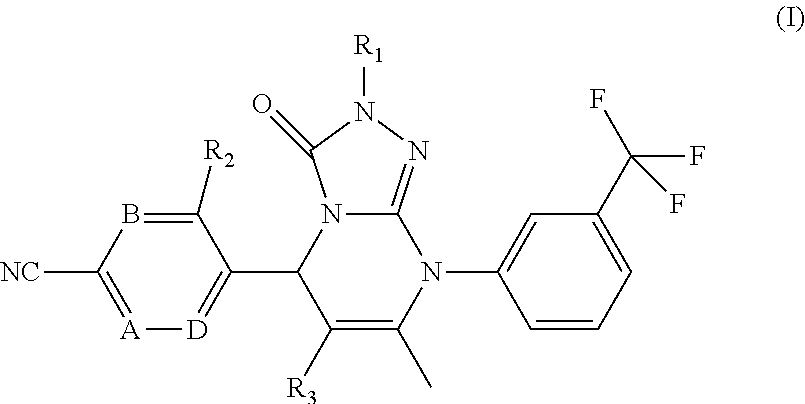Pyrimidinone compounds as human neutrophil elastase inhibitors
a technology of neutrophil elastase and pyrimidinone, which is applied in the field of heterocyclic compounds, can solve the problems of reducing the elasticity of the skin,
- Summary
- Abstract
- Description
- Claims
- Application Information
AI Technical Summary
Benefits of technology
Problems solved by technology
Method used
Image
Examples
example 1
5-[4-Cyano-2-(4-hydroxy-but-1-ynyl)-phenyl]-7-methyl-3-oxo-8-(3-trifluoromethyl-phenyl)-2,3,5,8-tetrahydro-[1,2,4]triazolo[4,3-a]pyrimidine-6-carboxylic acid methyl ester
[0492]
Intermediate 1
4-(2-Bromo-4-cyanophenyl)-6-methyl-2-thioxo-1-(3-trifluoromethylphenyl)-1,2,3,4-tetrahydro-pyrimidine-5-carboxylic acid methyl ester
[0493]
[0494]3-Trifluoromethylphenylthiourea (12.8 g, 87 mmol), 2-bromo-4-cyanobenzaldehyde (18.3 g, 87 mmol), and methyl acetoacetate (10.4 mL, 96 mmol) were dissolved in THF (300 mL) under an atmosphere of N2 and then trimethylsilylphosphate (18 g) in THF (50 mL) was added, and the mixture heated at 75° C. After 17 hours the reaction mixture was allowed to cool, poured onto 0.5 M HCl (600 mL) and stirred for 30 minutes. The mixture was extracted into EtOAc. The organic phase was washed with water, then brine and dried (Na2SO4) before being concentrated in vacuo. The resulting solid was triturated with Et2O (50 mL), filtered and the solid collected to yield the title...
example 2
5-[4-Cyano-2-(3-dimethylamino-prop-1-ynyl)-phenyl]-7-methyl-3-oxo-8-(3-trifluoromethyl-phenyl)-2,3,5,8-tetrahydro-[1,2,4]triazolo[4,3-a]pyrimidine-6-carboxylic acid methyl ester formate salt
[0513]
[0514]Intermediate 4 (400 mg, 0.75 mmol), 1-dimethylamino-2-propyne (160 μL, 1.5 mmol), bis(triphenylphosphine)palladium(II) dichloride (79 mg, 0.11 mmol) and copper (1) iodide (43 mg, 0.23 mmol) were dissolved in DMF (2.5 mL) and triethylamine (2.5 mL) and purged with N2 for 5 minutes. The reaction was then heated at 125° C. for 50 mins using microwave irradiation. The reaction mixture was filtered through a plug of celite and then diluted with EtOAc. The resultant solution was washed with brine, dried (Na2SO4) and evaporated in vacuo. A portion of the resulting residue (25 mg) was purified by reverse phase HPLC (Method 1) using a gradient of 10-40% (+0.1% formic acid) and gave the title compound as an off-white solid (11 mg).
[0515]LC-MS (Method 3): Rt=3.38 min, m / z=537 [M+H]+
[0516]1H NMR ...
example 3
5-[4-Cyano-2-(3-dimethylamino-prop-1-ynyl)-phenyl]-2-(3-methanesulfonyl-propyl)-7-methyl-3-oxo-8-(3-trifluoromethyl-phenyl)-2,3,5,8-tetrahydro-[1,2,4]triazolo[4,3-a]pyrimidine-6-carboxylic acid methyl ester
[0517]
Intermediate 5
1-Bromo-3-methanesulfonyl-propane
[0518]
[0519]3-(Methylsulfonyl)-1-propanol (276 mg, 2 mmol) was dissolved in DCM (10 mL) and then CBr4 (730 mg, 2.2 mmol) was added followed by PPh3 (580 mg, 2.2 mmol) portionwise under an atmosphere of N2. The resulting solution was stirred at RT for 17 hours. The mixture was partitioned between DCM and water. The organic layer was separated, washed with brine, dried (Na2SO4) and evaporated in vacuo. The resulting residue was purified by silica gel chromatography eluting with 50% EtOAc in cyclohexane to yield the title compound as a colorless oil (297 mg).
[0520]1H NMR (400 MHz, DMSO) δ 3.63 (2H, t, J=7 Hz), 3.25-3.20 (2H, m), 3.01 (3H, s), 2.27-2.19 (2H, m).
5-[4-Cyano-2-(3-dimethylamino-prop-1-ynyl)-phenyl]-2-(3-methanesulfonyl-...
PUM
| Property | Measurement | Unit |
|---|---|---|
| mass median aerodynamic diameter | aaaaa | aaaaa |
| temperature | aaaaa | aaaaa |
| temperature | aaaaa | aaaaa |
Abstract
Description
Claims
Application Information
 Login to View More
Login to View More - R&D
- Intellectual Property
- Life Sciences
- Materials
- Tech Scout
- Unparalleled Data Quality
- Higher Quality Content
- 60% Fewer Hallucinations
Browse by: Latest US Patents, China's latest patents, Technical Efficacy Thesaurus, Application Domain, Technology Topic, Popular Technical Reports.
© 2025 PatSnap. All rights reserved.Legal|Privacy policy|Modern Slavery Act Transparency Statement|Sitemap|About US| Contact US: help@patsnap.com



